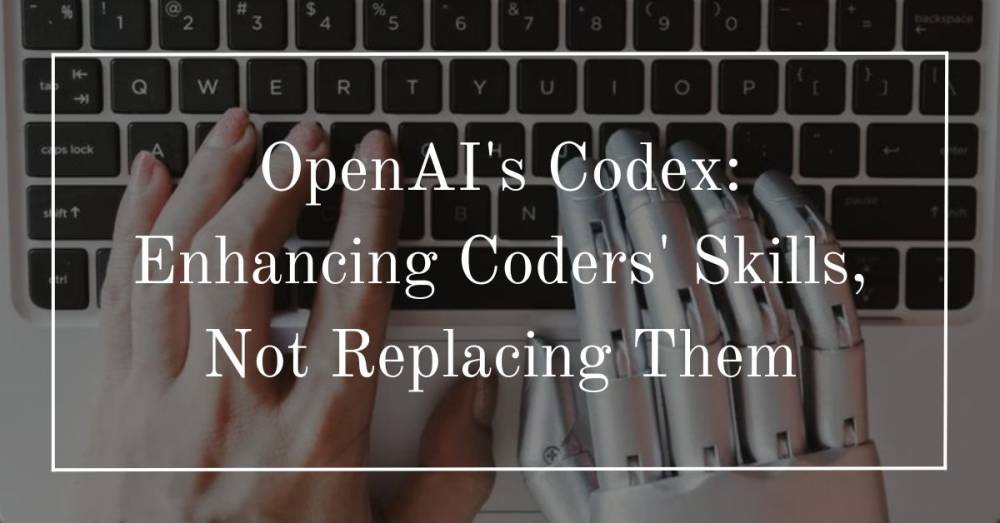
Codex by OpenAI: Empowering Coders and Amplifying Demand
People are talking about OpenAI right now because its smart chatbot, ChatGPT, has sparked people's imaginations and made them wonder what part artificial intelligence will play in the future. Codex, a less famous service that could completely change how developers work, has also been made by the same company.
Using information it has gathered from all over the web, ChatGPT can answer almost any question asked of it, though not always correctly. Its answers look like they were written by a person. Codex is the same, but instead of writing words in English, it writes computer code. Tell Codex what kind of software problem you're trying to solve, and it will come up with a string of code to help you solve it. It can also finish lines of code you are already writing.
If an AI service can now write code for developers, it makes you wonder how it will affect students learning computer science and if high-paying software engineering jobs will go away.
Still, software engineering skills will continue to be in high demand, and academics and computer science education experts say that AI services like Codex are just the next step as writing gets easier over time.
Developers have been able to use Codex in the form of GitHub Copilot since 2021. Semafor said that OpenAI, which has raised more than $10 billion from Microsoft and other investors, has been putting more money into Codex recently. It has hired more than 1,000 people to write code and descriptions that will help Codex learn to be a better programmer.
Christopher Manning, a professor of computer science and linguistics at Stanford University, said that Codex and ChatGPT are a "huge productivity enhancer," and that many programmers already use Codex in their daily work. Still, he said, the fact that Codex can write basic functions that make an engineer's job easier doesn't mean that it can write whole apps on its own.
Each new generation makes it easier to code.
Hadi Partovi, CEO and cofounder of the education organisation Code.org, which makes computer science lessons for K–12 students, said that programming has been getting easier with each generation.
"Programming started with punch cards," he said. "We no longer use punch cards." After that, coders started typing with keyboards and using a low-level language called Assembly to talk directly to a machine's hardware.
In the same way, Codex makes some software engineering jobs even easier. Partovi said that a tool like Codex makes it so that programmers don't have to spend as much time doing work that has been done a million times before. However, they will still need to understand the code that the tool produces. Developers who use Codex or a similar tool but can't explain what their code does won't be able to work as engineers.
Codex can help writers fill in lines of code, but they still need to know how to solve a technical problem in the first place.
Partovi said, "I'm sure it will make engineering easier." "Then we'll have more software engineers and more engineers in general. The only thing that limits the demand for technology is the number of engineers."
Trying to make the next big thing
A senior professor in computer science at Stanford University, Cynthia Lee, said that one of the biggest worries for teachers is that students will use programmes like Copilot to write code for them and then be disappointed that the programme can do the work on its own. She said that other teachers have told her they are worried that students have given them work done with Codex.
Lee is worried that Codex might make students who are having trouble with their work lose interest. "Tools like Copilot make a problem we've always had, which is how to get people to do the things they need to do in order to learn, even worse." she told me.
Lee said, "It just takes a lot of talking with students about the real basics of 'Why are we here?'"
Codex is a force booster that can speed up programming work, but it mostly just spits out code that has already been written by other people. It does this by gathering information from software packages that have already been made. Lee is still optimistic about technology as a whole, and she stressed how important it is for kids to keep learning how to make software.
"There will always be a new frontier of creation," Lee said.
Innovation can move faster with Codex.
Manning said that the benefit of tools like Codex is that they can replace the manual searching that coders usually have to do on the internet to find ways to debug their code and software packages that support the code they are writing.
For example, programmers might use the Python language to look at the text on a website. With Codex, they can just write a message asking for the code they need to do the job, and the service will give it to them.
"Even people who work in the field are surprised by how quickly these models have improved and how well they work," Manning said. "But these models are definitely not perfect, and you won't be a good software engineer if you can't tell when something is wrong and it's making the wrong code or there's still a bug."
Interested in the latest updates on AI technology? Follow us on Facebook and join our group (Link to Group) to leave your comments and share your thoughts on this exciting topic!
